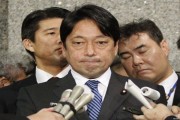Imagine walking into a club and being given a piece of paper saying, ‘No dancing please’. To go down the stairs leading to the dance floor, to find a large sign saying ‘NO DANCING’ hanging on the wall. Imagine, that on the unusually empty dance floor someone begins to dance, only to be stopped by a bouncer.
The dance-ban in Japanese clubs began at the end of 2010, when several clubs in Osaka were targeted by police and shut down. Then in April 2012, the famous DJ Takkyu Ishino was surprised to have his live set raided by police in Fukuoka. As the crackdown continued, this prompted celebrities such as the composer Sakamoto Ryuichi to speak out against the regulation of dancing, and the formation of a movement known as ‘Let’s Dance’, where people are collecting signatures trying to take ‘dancing’ out of the acts restricted under the Entertainment Business Control Law, or ‘Fueiho’, as it is known in Japanese. This law states that officially, clubs that are under 66 meters square cannot apply for a license to legally allow dancing. In Tokyo, where land is scarce and clubs are small, this covers almost every club in town.
This feature article from Ameba News explores the origin of Fueiho and how it came into place, with netizen opinions on the dance ban also translated below.
From Ameba News:
‘The Entertainment Business Control Law is a Law to Diminish the Anxiety Felt by Good Citizens’-Kureichi Matsuzawa, an Expert in Adult Culture Explains.
Matsuzawa claims that the tightening of regulations regarding the entertainment businesses originate in the collapse of community in modern society
In recent years, there has been an obviously stricter regulation of dance clubs by the police. When was this law, ‘Fueiho’, short for ‘Entertainment Business Control Law’ that regulates dance clubs made? Matsuzawa, an expert in adult culture explains the “deep” connection between the law and Japanese culture.
The history of Fueiho goes way back to the Taisho period (1912-1926), when police tried to regulate the big boom in dance halls back then. A son of the nobility eloped with a town girl that he met at a dance hall, and his parents asked the police commissioner, a friend of theirs, to investigate the case. This started the first wave of dance hall regulations.
As a backdrop, dance halls were a place that was ‘morally questionable’ for conservative people. Men and women who didn’t know each other danced hand-in-hand, so there would be love, lust, and possibly sex. Such behaviour was linked to dance halls, and as it was also a foreign concept that arrived from the West, it was condemned as being against public morals.
At the same time, it was, for the older generation, “an incomprehensible, scary place”. Different from the 1880s when the Rokumeikan, Japan’s first Western style dance hall was introduced, now there was jazz, and for some, it was hard to understand youngsters going crazy over music that they did not quite get. Like today there are elders who are overly scared of the internet- it’s the same idea. Same as games. Some cannot tolerate others enjoying things that they do not enjoy or understand themselves. If some enjoy something they don’t, they would be jealous. If it’s something dangerous, it has a bad effect on society. So it should be eliminated.

What we should take note of, is that even at this point, the police didn’t initiate regulation themselves, but only did so when there was a request. Sometimes it is the politicians that control the police, but often the public consciousness also has control of what the police does. There’s no point just blaming the police.
It may sound stupid for those that know what is being ‘regulated’- but then, the real stupidity began. Depending on the law, students, even if they were over 20, what is considered adult in Japan- could not enter dance halls anymore, and department stores prohibit their employees from going there. As a result, it became hard for young women to go to such places.
Then what happened was, that there was nobody for the male customers to dance with. So a ticket system was introduced. Dance halls would employ female dancers, customers bought tickets that they handed to the dancer, and they would dance for one song. These dancers were called “taxi dancers”.
Of course, the men would try to get the girls into bed. The dancers were professionals, so they would say sweet nothings and try to get the men to dance a little more with them, earning tickets. Although when regular customers came to see her every day, out of courtesy she would go for dinner once in a while. If the man bought her clothes and bags and nice things then, some would consider going to bed with him. Then there would be girls who would do it for money. So, along with waitresses at cafés, dancers came to be considered half-prostitutes. So it was the regulations that made dance halls into places for prostitution.
Before WWII, there were licensed quarters for prostitution. There were licensed prostitutes. Other than that, there were quarters such as Kamedo and Tamanoi, inhabited by private prostitutes. These places originated in Asakusa, and although the police repeatedly tried to clear out the area, they failed. After the Great Kanto Earthquake, the police gave up and moved them to Kamedo and Tamanoi, where they turned a blind eye.
Prostitution that went on in other places were unlicensed prostitution, and were subject to regulation. Dance halls became places of prostitution due to regulations, and then this became the subject of regulation against prostitution. A vicious cycle came into place.
The regulation of cafés came in place a little later than dance halls, but it put in place regulations to prevent unlicensed prostitution, such as banning waitresses from meeting customers outside of their workplace.
These regulations are the origin of Fueiho that came in place after the war. Pre-war, dance halls, dance schools, cafés, cabarets, and recreation halls were regulated with several laws. When Japan lost the war, these laws became void. So in 1948, to take over, a new law was put in place- a law called ‘Fuzoku Eigyo Torishimari Ho’, in short, Fueiho, or the ‘Entertainment Businesses Control Law’.
The regulations actually became a lot more relaxed, but the train of thought remained the same. For example, nightclubs must be over 66m squared. This came from is the pre-war regulation. Probably because in order to dance socially, there needs to be about that much space. This law is currently making nightclubs unable to operate.
Some say that it’s insane to have a 60 year old law regulating nightclubs today, but actually these regulations were made about 80 years ago. What really started it was about 90 years ago, some idiot couldn’t forgive his son for having eloped with a girl 笑
Since the change from the pre-war regulation to the post-war Fueiho, there was a big shift. Post-war, the licensed prostitution system was abolished, and until 1958 when laws to prevent prostitution was put in place, prostitution itself was legal. So dancers and waitresses could sell sex as much as they liked.
Actually, there was a law that banned organized prostitution at the time, but dancers and waitresses were doing it one on one, so it was legal. It’s not feasible to try and prevent something that is legal, so the aim shifts to protecting good public morals. It’s all quite ambiguous.

After the amendment in 1959, a new aim was added: ‘to prevent bad influence towards youth.’ This was in reaction to juvenile delinquents becoming a social problem around 1945-1955. There was an extortion case that took place in a dance hall, and late-night tea salons were seen as a place for the youth to loiter around in, which was seen as necessary to regulate. At the same time, it was a way to condemn those that praised young rebels, such as the Taiyozoku, or the ‘people of the sun’. This was a phenomena born out of the novel Season of the Sun, which was written by our current Tokyo City Mayor Ishihara Shintaro, with which he won the Akutagawa prize
After that, there were several amendments made, each in 1984, 1998, and 2005. The amendment in 1984 was particularly significant, as no panties tea salons, fashion health and peep show theaters that had appeared around that time were to be regulated. The name changed to ‘Fuzoku Eigyo Tekiseika Hou’, the current official Japanese name of the ‘Entertainment Business Control Law’ as it is called in English. In 1998, sex brothels without physical brothels were approved. This is called Deriheru, short for ‘Delivery Health’. The word ‘health’ is often used as a euphemism for sexual acts stopping short of actual intercourse in the Japanese sex industry, which circumvents the Fueiho regulations.
Although there has been changes to the Fueiho over time, it can be said that in general, in part, the law has always been a way for the police and conservative people to “ease their anxiety towards the unknown”. Of course not all adult entertainment businesses apply to this, but for the law, it can be said that there has always been such an aspect.
For example, karaoke boxes- even though some use it to have sex, some use it to trade drugs, some Yakuza use it for transactions of goods and money, because they are used by adults as opposed to just youth, and since it is known to them what goes on, and since they also enjoy using karaoke boxes themselves, it does not become a target for regulation.
However, if one’s son or daughter is behaving badly, their grades are falling, and one hears that he or she is frequenting nightclubs, suddenly nightclubs start looking like the culprit. It’s the same as it was in the Taisho period. Parents that failed to educate and bring up their children well, always try to look for culprits outside of themselves. Fueiho is a hero to such idiotic parents.
It’s not necessarily bad because it’s an old law, and the Fueiho has been amended several times, so it isn’t exactly the same as the old times. However, there is room for things to be reviewed. Laws can be changed according to the times and, unnecessary sections should be taken out. Well, it must be changed, rather.
However, I’m not supporting to “abolish the whole of Fueiho” as some are suggesting today. I understand those that are against strip clubs being built next to a school, a pachinko parlour being built next to a library, a cabaret being built right next to their houses.
However in some cases like in onsen towns, there is no problem for strip clubs, soaplands and kyabakura to be operating late into the night. In some cases, the locals want things to be that way.
For those areas affected by the 3/11 earthquake, what’s wrong with them attracting customers by allowing sex shops, cabarets and clubs to operate 24 hours? With the current law, there is no flexibility to allow such things. I believe that laws need to be adjusted according to times, and also to local preferences.
However reality is moving in the complete opposite direction. For the sex industry, a comprehensive cleansing campaign for the red-light district of Kabukicho in Shinjuku wiped out all illegal sex shops. Operation of Kyabakura has also been strictly regulated. as a result, buildings in Shinjuku, once full, is now empty. Some building owners have gone bankrupt. Many businesses that relied on sex shops and kyabakura have been forced out of business.
Also because the sex business has been forced into operating as ‘delivery health’, where prostitutes go to the customer’s desired location, crimes against them have become worse. Of course, in sex shops, it’s harder for customers to harm the women. The shop’s employees come to the rescue and the criminal will be caught. There were crimes amongst employees and owners being killed by his employees, but the prostitutes themselves rarely got killed by customers. The case in Yoshiwara a couple of years ago was an exception that may happen once in decades.
However, with delivery health, every year there are prostitutes getting killed and being harmed. There are probably a lot more that goes unreported. There are many small incidents that goes unreported to the police. It has become hard to even grasp what is going on. The risk for sex workers have become high. Everything has just become ‘invisible’.
Even so, the police are on a roll which started with the cleansing of Kabukicho, and what used to be the ‘gray zone’ are no longer free to operate. Strip clubs, ‘happening bars’ [swinger’s clubs] have been shut down for indecent exposure, and regulation against love hotels have become stricter according to Fueiho.
In the past few years, girls bar have also become a target. What is different now is that even if the women do not accompany a customer to a ‘seat’, it is seen as having entertained them. Even if the customer is at a counter table seat and if the girls play games or play the tambourine along to karaoke, now it is considered as entertainment and is subject to regulation by the Fueiho. Even playing word games become entertainment.
It’s hard to notice as in many widely reported cases there have been middle school and high school girls involved, but ‘entertainment’ across a counter table have become commonplace.
It is commonly believed that places with only counter tables are not considered as places for entertainment, but this is not true. The rule that even such places count as entertainment has been in place for half a century, put forward by the police, and it’s just that it hadn’t been enforced until now. However, since it has now come into place, ‘snack bars’ may become subject to regulation. Then, there will be no more Golden-Gai or Shinjuku Nichome.
It’s not a subject that is widely talked about, but many gay cruising spots have been shut down due to ‘indecent exposure’. This year, several gay bars and ‘New-half clubs’ (transgender bars) have also been raided. Until now, gay society had not been subject to regulation as it was considered that it does not affect the whole of society, but times have changed. We could say that gays and transgenders are now treated equally by the police.
The problem has profound roots. In Ryo Isobe’s book ‘Japan:The Country Where Dancing Is Banned’, sociologist Shinji Miyadai says that ‘new inhabitants’ that do not belong to traditional communities support this movement. They try to make unsightly things invisible, try to unburden their responsibility onto society and if there’s trouble, they call the police.
There’s no doubt that these ‘new inhabitants’ are making society a suffocating place, but if you think a bit, most city dwellers are ‘new inhabitants’. You can tell a lot by looking at those who use the internet. When they see something odd, they say ‘this gotta be illegal’ and they call the police. If there’s someone living above them in their mansion is making a lot of noise, they don’t go complain themselves or call the landlord, but directly call the police.
Until now, everything was sorted out by communication within the communities. People would try to work it out, by convincing others, adjusting, and compromising. When the ‘other’ is someone you know, people would be more accommodating. Now there is none of that.
In a society without communities, the only common ground becomes laws and people rely on the police to solve every problem. Then obviously, then police become more powerful.
Rise of such citizens combined with the growing passion within the police to cleanse out ‘problems’ have turned into such a movement. Whenever police does anything, often it is seen as it is in pursuit of concessions, but what has been happening in the past 10 years is not totally explainable by it.
My conclusion is that changing the law is the only way to go, but I don’t think that it’ll happen that easily. I think most club-goers will just go to bigger clubs where they can bypass the Fueiho and the Entertainment Facilities Act. That’s because there is no community amongst the club-goers either.
I’ve seen on Twitter that some people were tweeting ‘where should I go next?’ when their favourite club has been shut down. I think maybe that’s too flippant but people don’t really have a strong connection to the clubs themselves.
In the 60s and 70s there were communities where there was culture. Music, art, theater, small scale zines, there was community that rebelled against local and blood communities, and sometimes things got political.
I was talking to the musician Saeki Kenzo the other day, but by the 80s those communities completely disintegrated and fell into pieces. Saeki says that in the club culture, there was no community to begin with. Just people gathering in the same space by chance.
However, we cannot hope to restore such communities. Instead, through the internet, would we be able to create a sort of community that does not consist of real, raw human beings? Or maybe we can develop a collection of individuals such as the Occupy Wall Street Movement, or the anti-nuclear movement.
Such discussion rarely happens, but this problem is not just about one law that needs to be changed. That’s why it’s difficult. That’s why it’s also interesting.
Comments from Naver Matome:
okome_terauchi:
Forbidding dancing in clubs? Isn’t it the same as forbidding peeing in toilets?
PremiumCuts:
They teach us how to dance in compulsory education and when we grow up, they take away places to dance. I don’t get how this country works.
matyukun:
Clubs making customers dance? That’s such a misleading way to put it. Clubs don’t force customers to dance. When customers feel good, they just move their bodies. What crime is dancing? Don’t the police have better things to do?
powwow:
Would we be seeing headlines like “8 towns people were arrested for making a dance space in an empty lot and made 20 customers dance Bon-odori”? Off course not. Then where’s the line between what’s okay and what’s not?
Shing02:
Dance regulations at clubs is on the same level as not allowing tattoos at hot springs. It’s not the tattoos or dancing itself that’s the problem, they’re just trying to shut out certain types of people. I’m against both, what we should protect is not antiquated rules but our own generations’ culture.
maxi:
Laws that don’t match the times need to be amended. (US constitution has an amendment clause). It’s stupid to try and regulate adult culture as it keeps changing. Perhaps it’s the right time to lobby.
lejewo:
I think this problem needs to be addressed by those that own the clubs. Not asking to allow them to operate under the current law but for them to make a new law that’s not about adult entertainment or restaurants. It’s obvious they must obey the law for restaurants if they operate as restaurants.
kana:
Right now I don’t even want to read the word Fueiho but I can see the light at the end of the tunnel. Before, dance classes and billiard places were included in the Fueiho, but do you know that they’ve been taken off because of some dance and billiard lovers worked for it? I think it’ll be difficult unless the club scene comes out clean but I think there’s hope.
Comments from 2ch.net:
名無しさん@12周年:
Dance is an act of courting.
So basically clubs are like orgies.
Of course it should be regulated as it’s a place where drugs are used.
名無しさん@12周年[sage]:
What if dance is taken off Fueiho?
Will dance culture flourish?
Should we leave those that dance and make noise outside deep into the night? Just asking to have dance taken off the law isn’t convincing.
名無しさん@12周年:
There’s lots of clubs that become drug havens. If it is corrected then it’s fine but since underage people go there, there needs to be regulation.
名無しさん@12周年
It doesn’t make sense to say okay to Karaoke boxes that operates late and say no to clubs. They should regulate karaoke boxes too.
名無しさん@12周年
No, it’s because there’s less crime.
The police want to keep their jobs so they’re scoring points where people are less likely to complain.
People on 2chan are acting as the big government and saying it should be regulated. That’s how it is, like many other things.
Comments from Blogos.com:
yahoo user 3a9b9:
Forcing children to dance hip hop at school and saying where people dance hip hop is a bad place, yes, it doesn’t make sense.
aBrEt4mamw:
It’s not surprising that police decide that clubs are a hotbed for crime activity and decided to regulate it.
tune21:
There are clubs where there is a lot of drugs.
I think that clubs should be taken off Fueiho only if they can ensure that there are no drugs and no alcohol is consumed by underage youth. Allowing them to operate past midnight makes me think it’ll increase drug activity.
spin:
There is no reason to regulate dancing. Dance is healthy. It’s obvious the current Fueiho has a problem.
退会者:
Idiots.
Nobody’s saying dance is illegal.
Nor is anybody saying dance is not art.
It’s just that laws are required when it becomes a business and when people want to gather money and people for it.
Would you claim “cooking is legal, cooking is art” and be able to open a restaurant without getting a permit from the health authorities?
t n k:
People saying dance is illegal must have experienced the go-go bars in Thailand.
What do you think? Have you been in a Japanese nightclub where dancing is prohibited?










